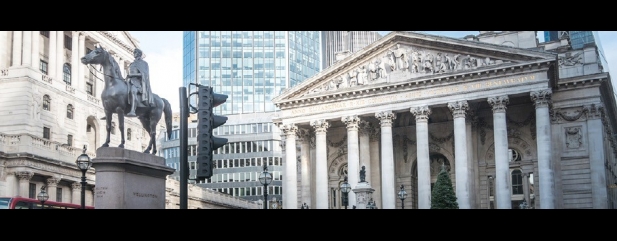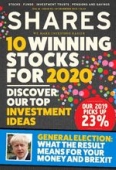Archived article
Please note that tax, investment, pension and ISA rules can change and the information and any views contained in this article may now be inaccurate.
UK banks rally but misconduct fines still hang over the sector

Shares in high-street banks Barclays (BARC), Lloyds (LLOY), Royal Bank of Scotland (RBS) and Virgin Money (VMUK) rocketed on 13 December after the landslide Conservative victory in the general election.

The banks were in demand amid expectations of higher bond yields due to Tory promises of higher public spending.
Higher bond yields are seen as necessary for banks to increase their net interest margin – the difference between what they charge on loans and pay for deposits – and therefore their profits.
With the election out of the way and the Government free to pursue its strategy on Brexit, hopes are that businesses will unleash a wave of pent-up investment and consumers will respond with an increase in spending in the months ahead, which should be good for bank lending.
However the banks are still not out of the woods as regards fines for misconduct. After years of penalties for mis-sold payment protection insurance (PPI) and for rigging the London inter-bank offered rate (LIBOR), two UK banks are in the firing line for rigging the currency markets.
Two US law firms have launched billion-dollar class action suits in London against a group of banks for rigging the foreign exchange markets between 2007 and 2013. The banks, including Barclays and RBS, have admitted illegally setting foreign exchange rates between themselves and have already been fined over €1bn by the European Commission.
The US claims have been brought on an ‘opt-out’ basis which means that all those affected by the banks’ actions can be automatically included in the class action case.
Meanwhile HSBC (HSBA), which isn’t included in the class action for currency rigging, faces a different but equally thorny problem. It has been ordered to pay $192m to the US Department of Justice (DoJ) to resolve an investigation into its role in helping wealthy American citizens evade taxes using undeclared Swiss bank accounts.
HSBC Private Bank in Switzerland has been charged with ‘conspiracy to defraud the US’ between 2000 and 2010 by helping US clients hide some of their assets and income offshore.
The DoJ claims that HSBC bankers travelled to the US specifically to ‘scout for clients’. Swiss lenders Credit Suisse and UBS have already paid out billions of dollars for similar activities and the whole of the Swiss private banking sector has had to undertake a major ‘house-keeping’ exercise in the wake of the DoJ investigation.
Important information:
These articles are provided by Shares magazine which is published by AJ Bell Media, a part of AJ Bell. Shares is not written by AJ Bell.
Shares is provided for your general information and use and is not a personal recommendation to invest. It is not intended to be relied upon by you in making or not making any investment decisions. The investments referred to in these articles will not be suitable for all investors. If in doubt please seek appropriate independent financial advice.
Investors acting on the information in these articles do so at their own risk and AJ Bell Media and its staff do not accept liability for losses suffered by investors as a result of their investment decisions.
Issue contents
Editor's View
Feature
- Top performing funds of 2019
- What were the key themes for small caps in 2019?
- Big companies with big decisions to make in 2020
- All change: an unusual period for FTSE 100 CEOs
- Tracking the performance of the biggest emerging markets
- Emerging markets: Views from the experts
- Is inflation really dead and what can investors do if it isn't?
Great Ideas
- Share pick for 2020: IG Design
- Share pick for 2020: Lloyds Banking
- Share pick for 2020: Redrow
- Our 2019 picks have smashed the market with a 23% return
- Share pick for 2020: Luceco
- Four great funds to buy for 2020
- Share pick for 2020: Kainos
- Share pick for 2020: Begbies Traynor
- Share pick for 2020: Hotel Chocolat
- Share pick for 2020: Centrica
- Shares pick 2020: Wizz Air
- Share pick for 2020: Schroders

 magazine
magazine








